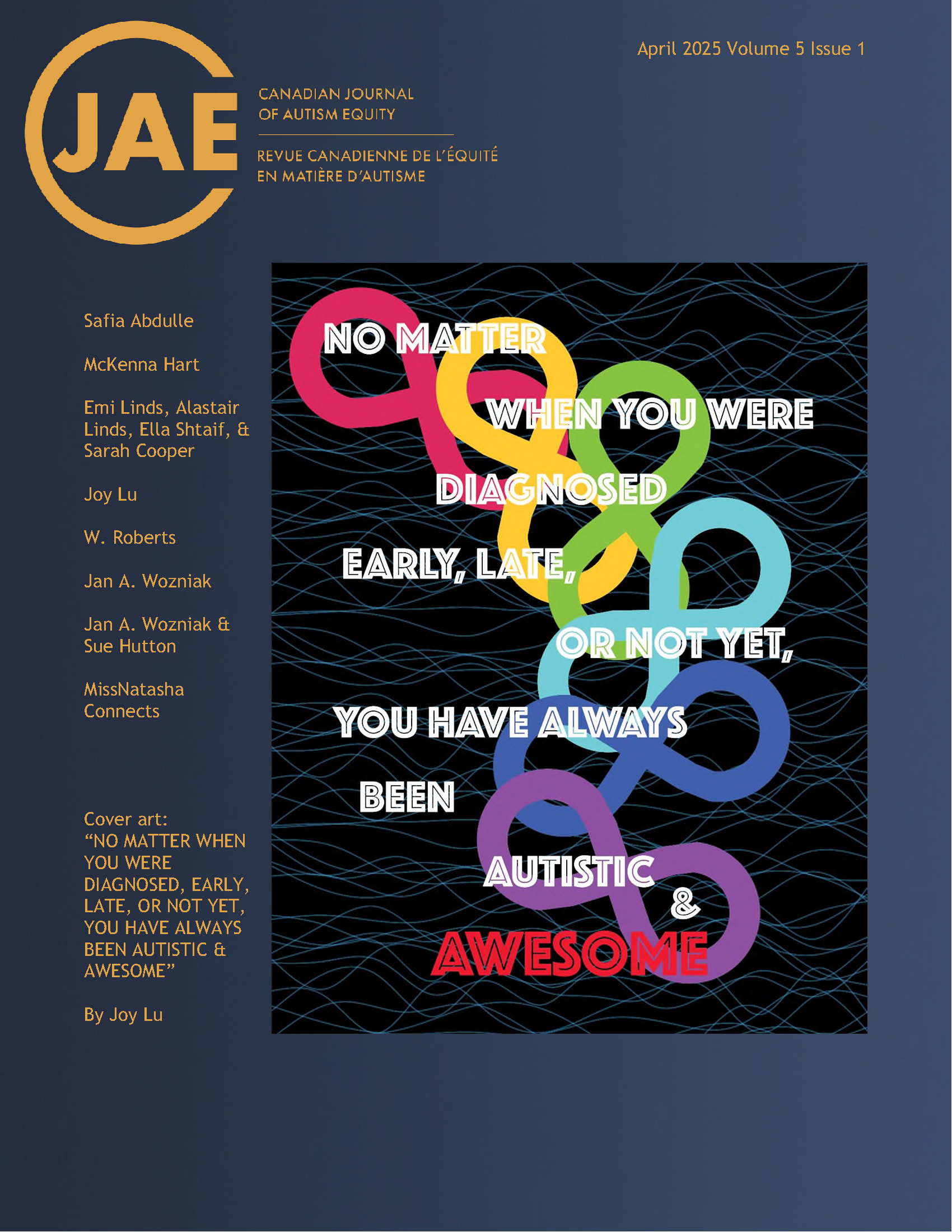Autism-Informed Mindfulness
Collaborative Practitioner Experiences
DOI:
https://doi.org/10.15173/cjae.v5i1.5902Keywords:
autism-informed mindfulness, virtual programming, co-facilitation, neurodiversity-affirming spaces, collaborationAbstract
Within Canada, there remains a continuing need for neurodiversity-affirming and community-informed programs and interventions for autistic adults. Over the past year, we—a late-diagnosed autistic adult practicing mindfulness and a mindfulness teacher interested in autism with extensive involvement in the autism community—have co-delivered mindfulness sessions to autistic adults, including self-diagnosed and formally diagnosed persons, using a synchronous virtual format. The manualized intervention outlined in this paper was initially designed and implemented by Lunsky and colleagues (2022). In this experiential commentary, we reflect on our experiences delivering this program and why collaborative partnerships like this are important for those intending to work with autistic individuals in clinical and therapeutic settings. Specifically, we highlight the tools and strategies we implemented within our formal and informal mindfulness practices to ensure that participants had their social and sensory needs met throughout the duration of our six-week program. Additionally, we discuss what we learned while co-facilitating autism-informed mindfulness and our recommendations for fellow practitioners moving forward.
References
Crane, L., Goddard, L., & Pring, L. (2009). Sensory processing in adults with autism spectrum disorders. Autism, 13(3), 215-228. https://doi.org/10.1177/1362361309103794
de Bruin, E. I., Blom, R., Smit, F. M., van Steensel, F. J., & Bögels, S. M. (2015). MYmind: Mindfulness training for Youngsters with autism spectrum disorders and their parents. Autism, 19(8), 906-914. https://doi.org/10.1177/1362361314553279
Gomot, M., & Wicker, B. (2012). A challenging, unpredictable world for people with autism spectrum disorder. International Journal of Psychophysiology, 83(2), 240-247. https://doi.org/10.1016/j.ijpsycho.2011.09.017
Hartley, M., Due, C., & Dorstyn, D. (2022). Barriers and facilitators to engaging individuals and families with autism spectrum disorder in mindfulness and acceptance-based therapies: A meta-synthesis. Disability and Rehabilitation, 44(17), 4590-4601. https://doi.org/10.1080/09638288.2021.1921859
Hourston, S., & Atchley, R. (2017). Autism and mind-body therapies: A systematic review. Journal of Alternative and Complementary Medicine, 23(5), 331-339. https://doi.org/10.1089/acm.2016.0336
Hutton, S. (2020, October 8). Learning to celebrate neurodiversity in mindfulness. Mindful. https://www.mindful.org/learning-to-celebrate-neurodiversity-in-mindfulness/
Jenkinson, R., Milne, E., & Thompson, A. (2020). The relationship between intolerance of uncertainty and anxiety in autism: A systematic literature review and meta-analysis. Autism, 24(8), 1933-1944. https://doi.org/10.1177/1362361320932437
King, R., Buxton, H., & Tyndall, I. (2024). Aphantasia and autism: An investigation of mental imagery vividness. Consciousness and Cognition, 125, 103749. https://doi.org/10.1016/j.concog.2024.103749
Kinnaird, E., Stewart, C., & Tchanturia, K. (2019). Investigating alexithymia in autism: A systematic review and meta-analysis. European Psychiatry, 55, 80-89. https://doi.org/10.1016/j.eurpsy.2018.09.004
Loftus, T., Mathersul, D. C., Ooi, M., & Yau, S. H. (2023). The efficacy of mindfulness-based therapy for anxiety, social skills, and aggressive behaviors in children and young people with autism spectrum disorder: A systematic review. Frontiers in Psychiatry, 14, 1079471. https://doi.org/10.3389/fpsyt.2023.1079471
Lunsky, Y., Redquest, B., Albaum, C., Hutton, S., Share, M., Share-Strom, D., & Weiss, J. (2022). Virtual group-based mindfulness intervention for autistic adults: A feasibility study. Mindfulness, 13(7), 1706-1718. https://doi.org/10.1007/s12671-022-01909-4
MacLennan, K., O’Brien, S., & Tavassoli, T. (2022). In our own words: The complex sensory experiences of autistic adults. Journal of Autism and Developmental Disorders, 52(7), 3061-3075. https://doi.org/10.1007/s10803-021-05186-3
Redquest, B., Tint, A., St John, L., Hutton, S., Palmer, P., & Lunsky, Y. (2022). Virtual group-based mindfulness program for autistic women: A feasibility study. Women’s Health, 18, 17455057221142369. https://doi.org/10.1177/17455057221142369
Rodgers, J., Hodgson, A., Shields, K., Wright, C., Honey, E., & Freeston, M. (2017). Towards a treatment for intolerance of uncertainty in young people with autism spectrum disorder: Development of the Coping with Uncertainty in Everyday Situations (CUES©) Programme. Journal of Autism and Developmental Disorders, 47(12), 3959-3966. https://doi.org/10.1007/s10803-016-2924-0
Scheerer, N. E., Curcin, K., Stojanoski, B., Anagnostou, E., Nicolson, R., Kelley, E., Georgiades, S., Liu, X., & Stevenson, R. A. (2021). Exploring sensory phenotypes in autism spectrum disorder. Molecular Autism, 12(1), 67. https://doi.org/10.1186/s13229-021-00471-5
Segal, Z. V., Williams, J. M. G., & Teasdale, J. D. (2002). Mindfulness-based cognitive therapy for depression: A new approach to preventing relapse. Guilford Press.
Shapero, B. G., Greenberg, J., Pedrelli, P., de Jong, M., & Desbordes, G. (2018). Mindfulness-based interventions in psychiatry. Focus, 16(1), 32-39. https://doi.org/10.1176/appi.focus.20170039
Thompson-Hollands & Barlow, D. H. (2015). Manual based treatments. In J. D. Wright (Ed.), International encyclopedia of the social & behavioral sciences (2nd ed., pp. 500-504). Elsevier. https://doi.org/10.1016/B978-0-08-097086-8.21045-3.
Trevisan, D. A., Parker, T., & McPartland, J. C. (2021). First-hand accounts of interoceptive difficulties in autistic adults. Journal of Autism and Developmental Disorders, 51(10), 3483-3491. https://doi.org/10.1007/s10803-020-04811-x
Westerberg, B., Bäärnhielm, S., Giles, C., Hylén, U., Holländare, F., & Bejerot, S. (2021). An internet based intervention for adults with autism spectrum disorder – A qualitative study of participants experiences. Frontiers in Psychiatry, 12, 789663. https://doi.org/10.3389/fpsyt.2021.789663
Downloads
Published
How to Cite
Issue
Section
License
Copyright (c) 2025 Jan A. Wozniak, Sue Hutton

This work is licensed under a Creative Commons Attribution-NonCommercial-ShareAlike 4.0 International License.
Authors retain copyright and grant the journal the right of first publication with the work simultaneously licensed under a Creative Commons Attribution License that allows others to share the work with an acknowledgement of the work's authorship and initial publication in this journal.
Authors are able to enter into separate, additional contractual arrangements for the non-exclusive distribution of the journal's published version of the work (e.g., post it to an institutional repository or publish it in a book), with an acknowledgement of its initial publication in this journal.
CJAE accepts articles that have not been published in any other journals/proceedings, unless copyright permission is assured, and have not been submitted for consideration to any other journals/proceedings at the time of submitting to the Canadian Journal of Autism Equity for consideration. While a paper is under consideration by CJAE, you agree not to submit the work to other journals/proceedings until review by CJAE is completed and a decision has been rendered.



